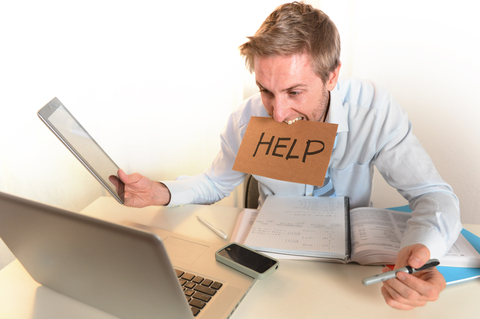 How many tasks can you handle at one time, successfully? The truth, based on research, ONE. Yep, that’s it. Our brains are not meant to do more than one mental task at a time.
How many tasks can you handle at one time, successfully? The truth, based on research, ONE. Yep, that’s it. Our brains are not meant to do more than one mental task at a time.
But wait, I can participate in a conference call while checking e-mails, updating project documents and texting my friends/family about weekend plans. I can do it all. I do it every day.
We think multitasking increases our productivity and we brag about how many things we can juggle at one time. But here’s the truth: multitasking makes us less productive. 20-40% of your time is wasted as you switch from task to task.
In addition to the decrease in productivity, research shows that multitasking:
- decreases creativity
- decreases the quality of work, increases error, increases rework
- decreases the ability to manage emotions…we get crabby, anxious, frustrated, overwhelmed
- decreases ability to focus, making us easily distracted
- limits the ability to filter irrelevant details
- increases stress, many tasks remain half-done, no satisfaction gained from completing tasks
- damages or limits relationships and collaboration
Consider minimizing your multitasking
The “experts” have many names for the opposite of multitasking (mono-tasking, single-tasking, being present, chunking, batch processing), but the gist of the research concludes that your brain, your body, your work and all of the important people in your life will benefit from your undivided attention.
Don’t panic. Just start small.
- Try shutting off your email and instant message notifications for 60 minutes each morning.
- Schedule your multitasking. If you know your 1PM conference call is primarily informational, save your email replies or document writing tasks for that hour. If another meeting requires your full attention, plan ahead to prevent distractions.
- Pick the two most important tasks each day and make sure they get your full attention until they are complete.
- Schedule time to disconnect. Do you really need to log in and do more work after dinner or after the kids go to bed? Reserve a few nights per week for connecting with friends and family. Close your laptop and fully enjoy your mindless TV or a good book or a long bath.
Read more about the side effects of multitasking and how to retrain your brain to FOCUS:
- Multitasking kills creativity and concentration via NPR with Clifford Nass, Stanford communications professor.
- Multitasking increases stress and condemns us to early mental decline via Forbes.
- You can lose up to 40% of your productivity if you multitask via Psychology Today. Includes great tips on how to cope with distractions at work.
